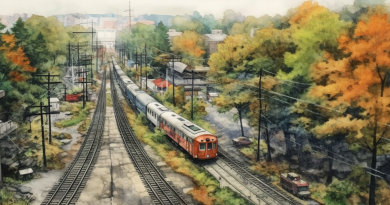Things To Look Out For In The New Year of 2024
With 2023 safely behind us (thank goodness), we can now look forward to what this new year will bring. I’m looking at a few specific areas for the purposes of this article, ranging from our local Detroit scene to the national or international stage.

In Mobility: Electric Bikes Will Save Us?
2023 seems to have been the year of the electric– nay, not car, but bike! Who knew!? Well, those of us who were early adopters certainly did! I’ve been biking a lot more this past year– electric or acoustic, as it were- after I started biking to w*rk beginning November 2022 and continuing all year-round, bringing to mind my old days working in BSEED and holding the dubious distinction of being the only inspector on staff to rely on a bike. Even as I type this, I am fretting over when I need to go take my bike to get snow tires put on (yes, that’s a thing, and yes, I could do it myself, but why would I do it myself when I could pay a professional $10 to do in five seconds what would take me several minutes?).
…eBikes are capable of displacing the majority of car trips for the majority of people.
Anyway, it’s a great opportunity to get the blood flowing while reducing your carbon footprint and saving money on gas. After all, we’re currently saving some bucks by splitting a car three ways in our household. Do we even need a car? I suppose not specifically, but it’s nice to have one for longer-distance trips. Still, the fact remains that eBikes are capable of displacing the majority of car trips for the majority of people.

In Politics: The Good, The Bad, The Ugly?
Gearing up for the 2024 presidential election, in which we’re faced with a geriatric grandpa versus a geriatric fascist, Donald Trump again leads the pack of Republican contenders, and, while it’s perhaps not as surprising to me that so many Americans are fanatically committed to a man who seems poised to be convicted of not one, but a number of federal felony charges, it’s, well, also not that surprising to me that the Republican Party can’t rally behind any real alternative. We have Vivek Ramaswamy, a comparably Trumpian con artist whose modus operandi seems to be to get on the air to see how insane he can sound. Ron DeSantis differentiated himself not just through the internal disarray of his campaign but also by making bizarre gaffes, like recent statements about invading the Bahamas. And Nikki Haley is going ham on the revisionist history of the Civil War, which, well, also not that surprising.
I bring up the Trump issue because the man continues to rail against immigrants “poisoning the blood of our nation” (which seems to be lifted straight out of Mein Kampf), and says he’ll be a dictator “but only on Day 1” in office. So, that’s obviously troubling. But more troubling than the bluster to me is the potential that the man and his fascist ilk could easily undo all of the progress that has been made in recent years on things like fixing the power grid, or getting people to care about climate change.
I don’t absolutely love all of the programs coming out of the DoE and the EPA these days, to be clear– they seem to disproportionately favor giant stakeholders rather than local community ones, and don’t, accordingly, support local levels of resiliency and decarbonization as much as they could. And I have some serious questions about the degree to which these agencies are effective in proportion to the billions of dollars they’re spending on stuff. Or how much they’re spending on electric cars, which, well, guess we’re already losing to China on that one (having met humans who work for the Big 2.5, I can’t say I’m that surprised). But they are catalyzing transformative investment in everything ranging from power grids to energy efficiency. Yes, some of that money is being invested in CCS, and yes, I have serious questions about that, too. But this falls into the category of how we probably need to embrace multiple approaches, even if only to prove that these approaches may well actually suck (this will be useful evidence in the inevitable future in which we litigate the oil majors out of existence).
Even Gretchen Whitmer, whose pro-suburban politics come across more as a moderate Republican than as a Democrat, has started at least talking about climate change.

In Planning: The Year of YIMBY?
We went from hearing complaints about the shortage of new housing for sale and rent in 2020, as the COVID19 pandemic disrupted real estate markets and, more generally, the flow of humans around the globe, to hearing about how we maybe need to actually let people build what they want on private property that they own (to wit: density, whether we’re talking about the accessory dwelling unit or a 2-family or 4-family apartment building replacing a single-family dwelling).
I’ve long said that YIMBY is a movement that should be able to bring together the left and the right owing to the fact that it provides a means toward traditionally progressive goals like energy conservation, reduction of environmental impact, improvement of social cohesion and social exchange, and an increase in the density of local tax revenue, as well as traditionally conservative goals like enforcing private property rights and freedom of choice. Of course, while that’s not how it plays out, it’s still a nice idea! And we will have more to report after the upcoming YIMBY organizing call for Michigan specifically.

But it’s a slam dunk if we think about how much of our cities is dedicated to surface parking. If you want to live in a single-family dwelling unit, there should be options for you, too. But this shouldn’t come at the expense of paving over all of our natural areas to build abject shit. Nor does it come with uncritically encouraging any development as good development (which was my primary interpretation of Nolan Gray’s film on the zoning debate in Caroline, New York). Nay, our primary focus should be densification of low-density areas within the urban boundary. This needs to begin with the vast swaths of parking lots. I think we could easily fit hundreds os thousands of units of quality housing across cities like Buffalo, Youngstown, Detroit, Cleveland, St. Louis, Chicago, Indianapolis, Columbus, Cincinnati, and more– without building a single suburban greenfield project.
And Beyond?
I’m staying tuned on all manner of horrific news coming out of the Middle East these days, including today’s revelation that I just read upon waking up (good morning!) that senior members of the right-wing extremist Likud government in Israel are considering attempting to relocate millions of people out of Gaza to– wait for it- the Democratic Republic of Congo! As one Threader suggested, it’s a particularly odd juxtaposition against a story that broke last year about an Israeli businessman being mired in some pretty egregious corruption over mineral extraction in that country.
And, to all of the folks who accused me of promoting Blood Libels and Antisemitism™ when I posted a 972 Magazine report on nearly the exact same thing a few months ago? Well.
Regardless, whether we’re talking about eBikes, YIMBY, national or international politics, or something else, it will be a good excuse for you to stay tuned to the latest and greatest from Your Handbuilt City in 2024 to see what’s going on and what commentary awaits.



